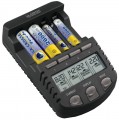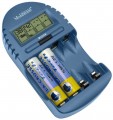Min. charge current
The smallest current that the device can provide in charge mode. If this parameter is specified in the specifications, this means that this model has the ability to adjust the charge current (otherwise, only the maximum current is indicated).
Charging current is one of the most important parameters for any charger: see “Maximum charge current. And the general range of current adjustment depends on this indicator: the lower the minimum value (with the same maximum) — the more extensive the possibilities for setting up the "charger" for the specific specifics of work.
Max. charge current
The highest current that the device can provide when charging the battery (or the nominal value of the charging current, if it is not adjustable).
Charging current is one of the most important parameters for any charger: it determines the speed of the process and compatibility with certain batteries. In general, the higher the current, the faster the process, the less time it takes to charge. At the same time, some batteries may have recommendations for the optimal current strength and restrictions on its maximum values. Therefore, mindlessly chasing a powerful charger is not worth it: at first it's ok to clarify how justified such power will be.
Note that in multi-channel devices (see "Independent channels"), the maximum current strength can be achieved when only part of the channels are operating. The indicators provided when all channels are operating simultaneously are indicated separately for such models (see "Charge current (all channels)").
Charge current (all channels)
The highest current provided by a multi-channel charger (see "Independent channels") at full load, with all slots (and, accordingly, channels) operating. In fact, a guaranteed maximum current provided by a multi-channel charger, regardless of the number of channels involved.
For the total charge current, see “Maximum charge current. Here we note that the full load is a rather complex mode in which the current strength can decrease. Therefore, this parameter is specified separately.
Number of settings
The number of separate charge current settings (see above) provided in the design of the charger. For example, a device with 4 settings may provide options for 200, 400, 800 and 1000 mAh. In general, the larger this number, the more accurately you can choose the charging current for a particular situation.
Min. discharge current
The smallest current that the device is capable of providing in battery discharge mode.
Some specific functions are based on the discharge of the battery installed in the charger (see below for more details); in this case, it often becomes necessary to set a certain value of current strength, which is optimal for a given battery. The lower the minimum discharge current (with the same maximum) — the wider the adjustment range and the higher the probability that the device will be able to provide the optimal discharge mode.
Max. discharge current
The highest current that the device can provide in battery discharge mode.
Some specific functions are based on the discharge of the battery installed in the charger (see below for more details). The higher the maximum value of the discharge current, the less time it takes to “drain” energy from the battery. On the other hand, for some types of batteries and discharge modes, specific current recommendations may be provided, and exceeding them can be fraught with overload, overheating, and even fire. Therefore, it is necessary to specifically pursue high values of the discharge current only if it is justified from a technical point of view.
Capacity recovery
The
capacity recovery function will be useful for batteries with memory effect - this time tech whose capacity has already declined. In this mode, the charger discharges and charges the battery several times in a special way, which eliminates the memory effect and restores the battery, if not to the original, then at least to a capacity close to this value.
Residual capacity check
A procedure to determine the actual capacity of the installed battery. When measuring capacity, the charger charges and discharges the battery (in some models - several times, for greater accuracy), measuring the actual amount of stored and released energy.
Checking the remaining capacity takes much longer than the “capacity measurement” item described above, but it is much more accurate and can be used not only to determine the characteristics of the battery, but also to diagnose its condition and degree of wear.
In box
In addition to the main charger, the package may include
batteries,
cigarette lighter adapter,
adapter to another type of battery and
bag (case). More about them:
- Battery. Some modern chargers can be equipped with batteries - of course, the latter are best suited for this model. Buying such a kit is often more convenient than buying a "charger" and batteries separately (at least it's faster).
— Cigarette lighter adapter 12 V. Presence of a charger adapter for connection to a car cigarette lighter socket. For more information about this connection, see "Charging from the cigarette lighter"; here we note that not all models with the possibility of such charging are initially equipped with auto adapters. Therefore, if it is important for you to be able to connect the charger to the cigarette lighter out of the box, you should pay attention to the models in the appropriate configuration.
- Battery adapters. Such adapters allow you to use the charger with batteries of "non-native" sizes (see above), and, as a rule, larger than standard ones. For example, a model for AA and AAA batteries can be equipped with adapters for C or even D. This is more convenient than using a charger that was originally designed for large sizes: the device turns out to be more compact, and if necessary, a large battery is connected...without problems through an adapter.
- Storage bag. The bag plays the role of a protective cover and can be used not only for storage, but also for transporting the charger. At the same time, it often provides additional compartments for various items - both complete, such as an external power supply, and additional, such as batteries. Therefore, and also because it fits optimally in size, a complete storage bag is much more convenient than impromptu cases.
